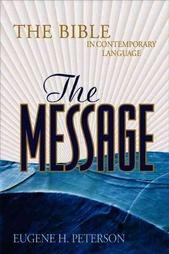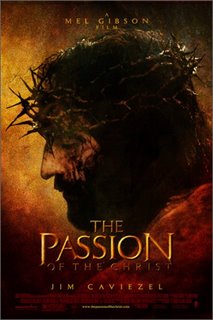 Most years, I've preached on one or the other Gospel readings for Palm Sunday, but today I've decided to present the Passion Sunday readings instead, as a single, unbroken reading. Instead of a sermon, I read Mark 14 and 15 from The Message, the modern scripture paraphrase by Eugene Peterson. While not an absolutely literal translation, I think it's a pretty good piece of work – one preacher's attempt to render the Bible into contemporary English, with a bit of creative interpretation thrown into the mix. I figure that hearing these familiar texts in Peterson's somewhat unfamiliar words will be a more memorable experience for my listeners – and, from the favorable comments I hear at the door afterwards, it appears I'm right.
Most years, I've preached on one or the other Gospel readings for Palm Sunday, but today I've decided to present the Passion Sunday readings instead, as a single, unbroken reading. Instead of a sermon, I read Mark 14 and 15 from The Message, the modern scripture paraphrase by Eugene Peterson. While not an absolutely literal translation, I think it's a pretty good piece of work – one preacher's attempt to render the Bible into contemporary English, with a bit of creative interpretation thrown into the mix. I figure that hearing these familiar texts in Peterson's somewhat unfamiliar words will be a more memorable experience for my listeners – and, from the favorable comments I hear at the door afterwards, it appears I'm right.In recent years, attendance at Maundy Thursday and Good Friday services has gone down, all across the country. That means, practically speaking, that many Christians leap directly from the "Hosannas" of Palm Sunday to the "He is risen" of Easter, without ever reflecting much on the painful and awe-inspiring events that took place in between. Perhaps one of the reasons why Mel Gibson's film, The Passion of the Christ, made such a splash a couple of years ago was that the events of Jesus' passion have become less than familiar to many people.
 I find it a powerful experience to read the whole story, myself. Most Sundays, I read and preach on scripture selections of no more than a dozen verses or so. That approach has a lot to recommend it, but sometimes there's something to be said for taking in the whole panorama. The Last Supper, the Agony in the Garden, Judas' Betrayal, Peter's Denial, the Trial, the Crucifixion, and finally the somber scene in which Joseph of Arimathea claims the Savior's body from Pilate and lays it in the tomb – together these discrete passages weave a tapestry that's worth viewing in its entirety. As I read the words, I'm struck again by what a moving story it is.
I find it a powerful experience to read the whole story, myself. Most Sundays, I read and preach on scripture selections of no more than a dozen verses or so. That approach has a lot to recommend it, but sometimes there's something to be said for taking in the whole panorama. The Last Supper, the Agony in the Garden, Judas' Betrayal, Peter's Denial, the Trial, the Crucifixion, and finally the somber scene in which Joseph of Arimathea claims the Savior's body from Pilate and lays it in the tomb – together these discrete passages weave a tapestry that's worth viewing in its entirety. As I read the words, I'm struck again by what a moving story it is.Besides, reading about and picturing the things Jesus suffered at the brutal hands of the Roman justice system has a way of putting my own physical suffering into proper perspective. In a few days' time, when my upper chest is again pierced by a slender, sterilized needle and the chemotherapy medicines slowly drip into my veins through my porta-cath, it's for the ultimate purpose of healing, not torture and death.
Jesus' sufferings are a means of healing in a very different sense, as these words of the prophet Isaiah make clear: words that originally had a very different sense, but which the Christian church has, over the centuries, come to see as referring to him...
"Surely he has borne our infirmities
and carried our diseases;
yet we accounted him stricken,
struck down by God, and afflicted.
But he was wounded for our transgressions,
crushed for our iniquities;
upon him was the punishment that made us whole,
and by his bruises we are healed." (Isaiah 53:4-5)

1 comment:
Dear Carl,
Joe and I were away from 4/8 to 4/15 so I have been catching up this morning on the blog. You are right about the Passion - it has been all but forgotten in recent years and Mel's movie really brought it home. It was shocking, I really cried and it has really stayed with me. What a movie! You have been extremely brave and I do pray for you regularly. Hope to see you on Sunday.
Robin
Post a Comment